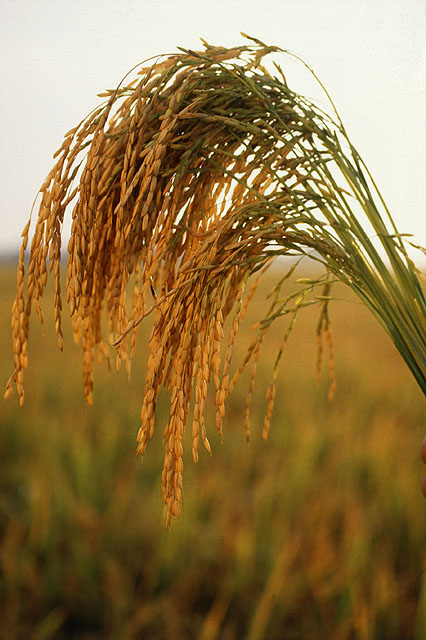"I think it's good public diplomacy," I said.
"You don't think it's propaganda?" she asked. I looked at the photo again, but as far as I could tell, there was no articulated message being distributed, so I said no.
"It's just a bag of
 rice."
rice.""Is it?" she asked. "Or is it a stuffed American flag?"
I could see what she was getting at, but I wasn't willing to bend. In "Propaganda: The Formation of Men's Attitudes," Jacques Ellul cites the following definitions of the word:
· "a manipulation of psychological symbols having goals of which the listener is not conscious" (popular in the United States during the 1920s)Ellul doesn't accept or reject any of these definitions, but goes on to argue that propaganda encompasses psychological action, psychological warfare, re-education, brainwashing, and public and human relations. He also states that propaganda persuades not with facts but with myths and that it success when dissent becomes negligible or non-vocal.
· "the expression of opinions or actions carried out deliberately by individuals or groups with a view to influencing the opinions or actions of other individual groups for predetermined ends and through psychological manipulations" (Institute for Propaganda Analysis)
· "an attempt to modify personalities and control the behavior of individuals in relation to goals considered non-scientific or of doubtful value in a specific society and time period" (Leonard W. Doob).
Ellul's is not the only definition of propaganda, but it is the one I had recently finished reading in preparation for a two and a half hour class from which I had only just returned, so it's no wonder that it was the first to come into my head. But despite the fact that I'd just spent two and a half hours talking about public diplomacy (or maybe because of it) I couldn't articulate my main point, which was that there's an important distinction between public diplomacy and propaganda, and I put the patriotic rice bag in the first category.
I can't remember exactly what I did say, but I know it was neither clear nor convincing. We went around in circles for a few minutes, and because my roommate is too polite to point out that I was a terrible debater, we let it drop. But it bothered me that I couldn't express myself better, so I'm taking another stab at it here.
According to the USIA, "Public diplomacy seeks to promote the national interest and the national security of the United States through understanding, informing and influencing foreign publics and broadening dialogue between American citizens and institutions and their counterparts abroad."
A bag of rice with an American flag tells a story: This rice comes from the United States. One could take it a step further and assume the bag was donated as humanitarian aid. Another step could allow one to assume either that the United States is a generous country, or that the United States wishes to be perceived as a generous country for ulterior motives. But that ambiguity is precisely what makes the rice a tool of public diplomacy and not propaganda: It allows room for dissent. It doesn't tell the entire story, it simply alludes to it. It's a generous action, designed to instill good will.
Ultimately, I t
 hink my roommate was objecting to the second message, which seemed stronger to her. She said it seemed arrogant to take such obvious steps to achieve recognition for a kind action. I imagine – although she did not specify – that she sees the alternative as a selfless act of anonymous charity. And while I approve of such actions for individuals, I'm not sure it's reasonable to expect the same for states. To make my case with a grotesque degree of oversimplification: 1) States wage war against one another, 2) One factor that can decrease the likelihood of war is to generate goodwill between states, 3) The objectives of public diplomacy can be useful in this pursuit. For me, the alternative to the flag-adorned rice isn't a blank bag; it's a missile defense shield.
hink my roommate was objecting to the second message, which seemed stronger to her. She said it seemed arrogant to take such obvious steps to achieve recognition for a kind action. I imagine – although she did not specify – that she sees the alternative as a selfless act of anonymous charity. And while I approve of such actions for individuals, I'm not sure it's reasonable to expect the same for states. To make my case with a grotesque degree of oversimplification: 1) States wage war against one another, 2) One factor that can decrease the likelihood of war is to generate goodwill between states, 3) The objectives of public diplomacy can be useful in this pursuit. For me, the alternative to the flag-adorned rice isn't a blank bag; it's a missile defense shield.But I'm new to the study of public diplomacy and I'm still not sure I'm making my case coherently, or even accurately, so I'm open to other opinions. Is it arrogant for a state to throw its emblem on every charitable act, or is it simply pragmatism?
No comments:
Post a Comment